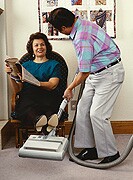
THURSDAY, March 29 (HealthDay News) — Simply by entering a room, you can add up to 37 million bacteria to the air every hour, according to a new study.
Most of this airborne bacteria is left behind by previous occupants and stirred up from the floor when you enter, Yale University researchers said.
“We live in this microbial soup, and a big ingredient is our own microorganisms,” principal investigator Jordan Peccia, an associate professor of environmental engineering, said in a Yale news release.
“Mostly people are re-suspending what’s been deposited before. The floor dust turns out to be the major source of the bacteria that we breathe,” he explained.
He and his colleagues measured and analyzed biological particles in a single, ground-floor university classroom over a period of eight days — four days when the room was periodically occupied, and four days when it was continuously vacant. The windows and doors were kept closed for all eight days.
When people were in the room, there was a substantial increase in airborne concentrations of bacteria and fungus of various sizes. About 18 percent of fresh and previously deposited bacteria in the room came from people, as opposed to plants and other sources.
This type of research could help efforts to develop new ways of improving indoor air quality, said Peccia, adding that Americans spend more than 90 percent of their time indoors.
“All those infectious diseases we get, we get indoors,” he noted.
The study was recently released online in advance of print publication in an upcoming issue of the journal Indoor Air.
More information
The American Lung Association has more about indoor air quality.

